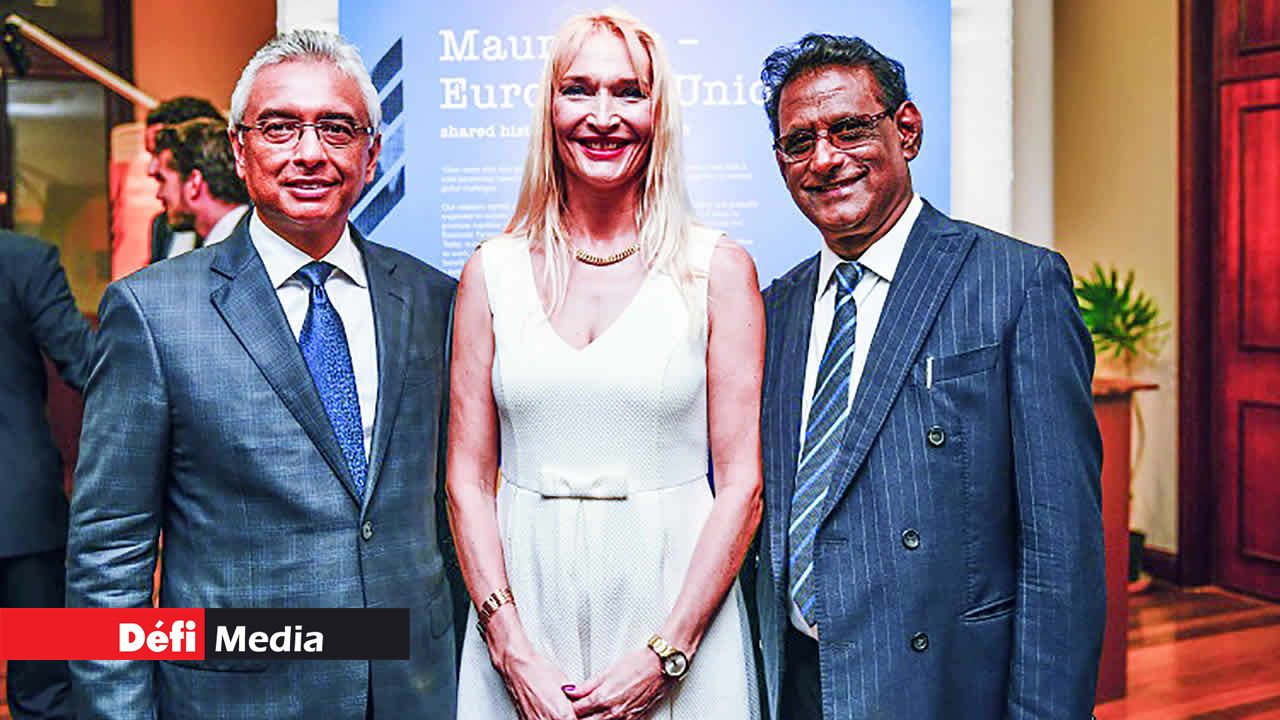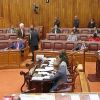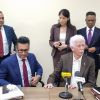
Ambassador and Head of Delegation of the European Union to the Republic of Mauritius and to the Republic of Seychelles, H.E Mrs Marjaana Sall is currently in Mauritius for European Week, which was held from 7th to 11th May.
Publicité
She is also responsible for the cooperation between the European Union and the Indian Ocean Commission (IOC). In this interview, she elaborates on the long lasting relationship between the EU and Mauritius. She also underlines the challenges that Mauritius needs to overcome.
Over the past 40 years, how do you describe the relation of Mauritius with the EU?
I can proudly say that our partnership with the Republic of Mauritius is solid and vibrant. We are longstanding partners, and for more than 40 years, our partnership has delivered results in key sectors for the Mauritian economy. It has also contributed to improving the livelihoods of thousands of people. In terms of development cooperation, Mauritius has been one of the countries that has greatly benefited from the EU cooperation with the Group of States of Africa Caribbean and Pacific (ACP).
Today, our partnership covers topics of mutual interest expanding beyond traditional development cooperation. These include maritime security, human rights, gender equality, trade, migration, culture and climate change. We have various common interests and the Political Dialogue we have with the Government on an annual basis is a key opportunity for us to discuss how to reinforce our partnership and to address global challenges together.
What have been the main areas of cooperation over these years?
Our relations have for a long time been focused on the sugar sector. Since 1975 with the Sugar Protocol, Mauritius' exports of sugar have benefitted from a preferential access to the EU market. This has played a key contribution to the economic development of the country.
Over the past 10 years, the EU has provided more than 300 million euros (more than Rs 12 billion) in support of the economic and social reform programme of the Government. Part of these funds was allocated to the sugar sector reform programme, at a time when it was facing the end of preferential access and quotas to the EU market. This support has allowed the sector to improve its competitiveness and to diversify.
We have also contributed to poverty alleviation and inclusive growth. Since 2006, more than 400 community-based projects have been successfully implemented in Mauritius, Rodrigues and Agalega. The EU is also funding projects to improve availability of potable water for the most vulnerable families in Rodrigues. EU and Mauritius also have solid trade ties. We equally have a yearly political dialogue.
Mauritius is aiming to become a high-income country. Do you think it is achievable?
I believe that it is achievable, but it will not be easy. The EU stands ready to support the Government in achieving its vision to evolve into a high-income country. We are already partnering with the Government of Mauritius in a number of key areas to promote economic growth, social equity and sustainable development. One area where we work together with the Government is Trade and Investment.
How is the EU going to assist Mauritius in this endeavour?
EU remains the main trading partner of Mauritius, and most importantly for Mauritian economy, the biggest export market. We are committed to continue supporting Mauritius to implement the Economic Partnership Agreement (EPA) we signed in 2009 and which provides duty- and quota-free access for Mauritius' exports to the EU. We are working closely with the Government of Mauritius to set up an electronic platform that will be a single point of entry for business permits and licences.
The project is implemented by the Economic Development Board, and will facilitate the business and investment environment and contribute to the Mauritius' Doing Business performance. Another important initiative in relation to EPA implementation is the Intellectual Property Rights reform and the work on Geographical Indicators. All these elements aim at creating growth and employment opportunities, and at making Mauritius a more modern and more competitive economy.
We are also working with the Government to address the issue of skills mismatch in the economy, one of the key constraints identified by Mauritius in its objective to graduate to a high-income country.
If Mauritius continues to raise its standards in various sectors, will it experience a decrease in grants and financial assistance from EU?
As Mauritius is an Upper Middle Income Country, our partnership has evolved from the traditional 'donor-recipient' philosophy to relations built on mutual interests and shared values. Together with the Government of Mauritius, we have regular discussions in order to maximise possibilities under various financial instruments.
I am proud that we have managed to have a considerable amount of funds to address key challenges such as climate change, greening the economy, skills mismatch, and to promote innovation and research, and facilitate the business climate. Moreover, blending (mixing loans and grants) is another innovative way to fund large infrastructure projects.
Mauritius has been one of the countries that have benefited most from the EU-ACP (Africa Caribbean Pacific) cooperation. How can European countries use Mauritius as a hub to penetrate the African markets?
Your question provides me with a good opportunity to say that the EU is Africa’s biggest trading partner; and around a fifth of global Foreign Direct Investment (FDI) that flows in Africa comes from EU companies. At the 5th African Union – European Union Summit in November 2017, the EU presented its External Investment Plan (EIP) to mobilise Investments for the sustainable transformation of Africa.
This plan aims to reduce risks for private investment on the continent, notably through the European Fund for Sustainable Development guarantee. It will also provide technical assistance in preparing investment projects, and strengthen political dialogue to stabilise investment in climate. I think that there could be opportunities for Mauritius' operators under this plan.
In terms of climate change, how can EU help Mauritius to cope with the effects?
We recognise the vulnerability of Mauritius as Small Islands Developing States (SIDS) to the impact of climate change. We provide EUR 3 million (i.e. MUR 115 million) for small holders in Mauritius and Rodrigues to adopt climate smart agriculture techniques. This programme also foresees to provide Technical Assistance on the adoption of climate smart agricultural practices by the small farmers' community. As a member of the Indian Ocean Commission, Mauritius also benefits from EU-funded regional projects that have climate change adaptation and mitigation as primary objectives.
We have initiated a policy dialogue on climate change as agreed at the Article 8 Political Dialogue of 2017 with the Government. We also have a project for sustainable tourism with the Tourism Authority with a view to greening the tourism sector. Through co-funding with the Agence Française de Développement, we also assist businesses in Mauritius to get access to lines of credit for green actions.
Mauritius is willing to be a knowledge hub in Africa. Do you believe it is viable?
I believe there is potential for Mauritius to become a knowledge hub. Mauritius already hosts many campuses, including the Africa Leadership College, which caters also for African students. But obviously, it will require continuous efforts to fully realise the objectives set by the Government. Mauritius is already implementing the Africa Strategy, which is part of the Government Vision 2030. We see this as an important initiative to increase investment flows in the country, which will eventually boost economic growth in Mauritius.
How can EU and Mauritius continue to strengthen their cultural links?
There are already strong cultural links between the Republic of Mauritius and EU Member States, in particular the resident ones (France and UK). At the EU level, we have supported a number of local initiatives over the last years. This year is the European Year of Cultural Heritage. The purpose of the Year is to raise awareness of the social and economic importance of cultural heritage and to celebrate Europe's cultural richness and diversity.
This is why we are organising a number of events for Europe Week at the Plaza. We are also organising a high level panel on cultural heritage and economic development where we will share our experience in Europe. We would like to further sensitise the citizens, in particular the young people, on the importance of their cultural heritage, which is so rich and diverse here in Mauritius. We would also like to organise other cultural events for the public at large, where they can discover European music, films, languages and food.
One major challenge you believe Mauritius is yet to overcome?
Mauritius stands at a crossroads in terms of appropriate policy choices that it has to make towards enhancing the human capital through science, technology, innovation and quality higher education. This is why the EU and the Government of Mauritius have decided to focus on our bilateral programme up to 2020 on Tertiary Education and Research and Innovation, which are critical factors in boosting the human capital in the country, thereby generating future growth.
The general objective is to assist Mauritius to evolve from an Upper Middle Income Country to High Income Country by improving the relevance, quality and equity in Tertiary Education and Research and Innovation, which are seen as key areas to transform Mauritius into a knowledge-based and innovative society.
Otherwise, what are the different upcoming projects for Mauritius from EU?
There are several projects in the pipeline, and I will name a few of them. In the area of social development, we have launched a call for projects for civil society organisations and we support a 3-year project implemented by the National Human Rights Commission to educate and raise awareness in Mauritius and Rodrigues about respect for Human Rights. We have started a policy dialogue with the Ministry of Gender Equality, Child Development and Family Welfare, specifically on gender. We also provide technical assistance for the elaboration of the Gender Equality Bill, Children’s Bill, Adoption Bill as well as capacity building on gender mainstreaming and data collection.
In the area of environmental protection, we will continue supporting businesses (including Small and Medium Enterprises) in their transition to a green economy in key areas such as transport, energy, tourism, and climate smart agriculture.
In the area of economic growth, we will continue to support Mauritius' regional integration agenda with the renewal of our support to the IMF Regional Technical Assistance Centre - AFRITAC South. We will also continue to work closely with the Government in its endeavours to unlock the full potential of the Economic Partnership Agreement, notably to further strengthen the investment and business environment, which is a priority for the Government.
We will pursue our cooperation in the area of fisheries and the ocean economy. We are fully engaged with countries of the region to promote maritime security. We confirmed this commitment during the Ministerial Meeting on Maritime security hosted by the Government of Mauritius that took place a few days ago.
After assisting the Government in developing its migration and development policy and action plan, we are now going to provide technical assistance for the development of an e-visas system. In other words, the partnership is not only a historical one; it is also one that is dynamic and diverse. I am really looking forward to continuing to work with the Government and with other stakeholders to promote sustainable and inclusive development of the Republic of Mauritius and to continuing to build a strong and solid EU-Mauritius partnership.

Notre service WhatsApp. Vous êtes témoins d`un événement d`actualité ou d`une scène insolite? Envoyez-nous vos photos ou vidéos sur le 5 259 82 00 !
















![[Info Soirée] : «Mo ena defo kouma tou dimoun, me mo ena prinsip»](https://defimedia.info/sites/default/files/styles/square_thumbnail/public/thumbnail_160424.jpg?itok=9_qDpQ9s)




